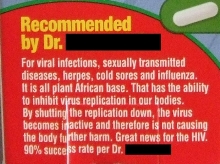Dozens of over-the-counter health supplements, including some potentially used by people living with HIV, viral hepatitis and other chronic diseases, are illegally labeled and lack scientific evidence for their marketed claims, according to a report released October 2 by the Office of Inspector General (OIG) of the U.S. Department of Health and Human Services.
 |
| Some supplements claim to prevent, treat or cure diseases. Source: Office of Inspector General |
The report stems from an analysis of both the structure and function claims of 127 dietary supplements marketed for weight loss or immune system support. OIG reviewed the claims to determine the extent to which they complied with FDA regulations, along with substantiation provided by manufacturers to describe the quantity and nature of the evidence. Investigators also assessed the accuracy and completeness of notification letters that manufacturers must submit to FDA for their structure/function claims.
Overall, substantiation documents for the supplements were inconsistent with FDA requirements for competent and reliable scientific evidence. Additionally, the report notes, seven percent of the supplements lacked the required disclaimer pertaining to unproven health benefits and 20 percent included prohibited disease claims on their labels.
In light of these findings, OIG recommends that the U.S. Food and Drug Administration (FDA) “seek explicit statutory authority to review substantiation for structure/function claims to determine whether they are truthful and not misleading.” The OIG investigators also recommend “that FDA improve the notification system for these claims to make it more organized, complete, and accurate,” adding that the agency should “expand market surveillance to enforce the use of disclaimers for structure/function claims and to detect disease claims.”
In commenting on the report, the FDA did not explicitly concur with OIG’s first recommendation, but said it would consider it. It did, however, concur with OIG’s second and third recommendations.
To read the OIG report, click here.







3 Comments
3 Comments